研究生英语泛读翻译第八单元
研究生英语系列教材上 第8单元 A篇课文译文

研究生英语系列教材上第8单元A篇课文翻译安全带可以避免乘客在车祸中受伤或死亡,这几乎是常识。
但是,约翰·亚当斯最近所做的研究得出了更加复杂的统计数据。
当司机系着安全带时,他们开车无所顾忌,更多车祸因此而发生。
座椅安全带的隐患1. 座椅安全带固然能降低我们在车祸中死亡的危险,但从统计数据看,情况并不是那么绝对。
事实上,据一位研究者说,安全带可能会使人们在驾车时更加肆无忌惮。
2.对于这个有危险的世界,如果有一件事我们还算了解,那就是座椅安全带可以救命。
当然,它确实可以救命、但实际情况通常要更混乱、更复杂。
伦敦大学学院的风险专家、地理学荣誉教授约翰·亚当斯早就质疑安全带能保证驾车安全的信条、亚当斯最早开始查看统计数字是早在25年前的事了。
他的发现与人们的普遍看法恰恰相反-----在I8个强制使用安全带的国家,要么交通事故死亡率根本没有变化,要么实际上反而导致了死亡率的净增长。
3. 怎么会这样?亚当斯用风险补偿的概念来解释这些数据资料,这个概念就是:人们往往会根据他们意识到的风险程度的改变来相应地调整自己的行为。
亚当斯解释说,假设一位司机驾车途中要过一个窄弯道,这名司机是个男青午,那么他会受到自己对以下两方面认知的影响:驾车的风险和驾车的回报。
他所考虑的东西可能包括:能够准时上班或准时赶赴朋友的饭局、让同伴对他的驾车技术留下深刻印象、使自己作为熟练驾车手的形象更加巩固。
他还可能考虑到自身的安全问题、长命百岁的愿望、对车上年幼乘客的责任感、撞毁自己的漂亮新车或驾驶证被没收的代价。
这些可能的担心也不是孤立存在的。
他还要考虑到天气和路况、交通拥挤的程度和所驾车子的性能。
但亚当斯说,关键的是这个司机还将根据他对风险变化的判断来调整自己的行为。
如果他系上了安全带,而他的车子带有前、侧气囊和防滑刹车系统,他驾起车来可能会更大胆。
4.亚当斯强调说,问题就在于自我感觉安全的司机们实际上对其他司机、骑自行车者、行人和自己车上的乘客来说是更大的危险(平均80%的司机系安全带,而同车后座的乘客只有68%系安全带)。
新视角研究生英语读说写1,第八单元课文翻译
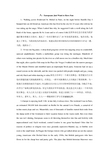
八、Europeans Just Want to Have Fun1、Walking across Boulevard St. Michel in Paris, on the night before Bastille Day I bumped into an old friend-an American who has lived in the city for 25 years-who told me he was taking up the tango. When I asked him why, he suggested I take a stroll along the Left Bank of the Seine, opposite Ile St. Louis and so of course I did.法国革命纪念日前夜当我穿越巴黎圣米歇尔大街时,遇见了一位在巴黎生活了25年的美国老朋友。
他告诉我,他迷上了探戈。
当我问他为何如此时,他建议我沿着圣路易岛对面的塞纳河左岸走一遭。
当然,我照办了。
2、It was one big party. A drop-dead-gorgeous crowd was tangoing away in a makeshift, open-air amphitheater. Nearby a multiethnic group was doing the meringue. Hundreds of others were tucking into picnics by the river as a full moon rose in a cloudless sky. Much later that night, after a perfect fish soup in the Place des V osges I walked into the narrow passages of the Marais District and stumbled upon an impromptu block party. Someone had set up a sound systom on the sidewalk, and the street was packed with people-straight and gay, young and old, black and white-dancing to salsa.那里正在举行一个盛大的舞会,俊男靓女们正在临时搭建的露天剧场跳着探戈。
(完整版)研究生英语上册第八单元英语与翻译对应
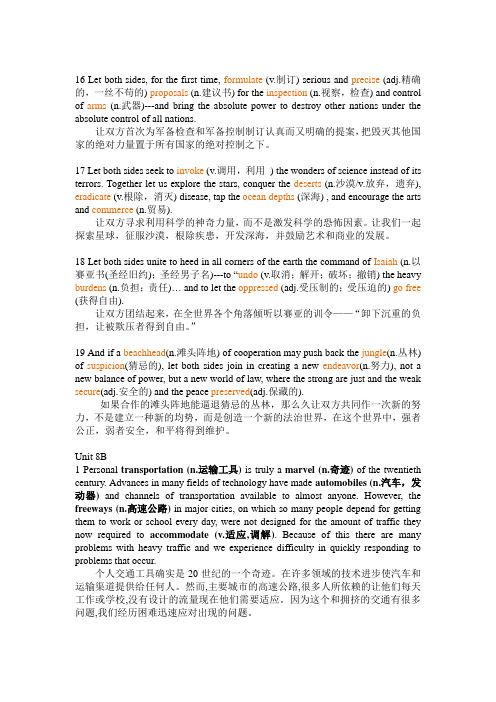
16 Let both sides, for the first time, formulate (v.制订) serious and precise (adj.精确的,一丝不苟的) proposals (n.建议书) for the inspection (n.视察,检查) and control of arms(n.武器)---and bring the absolute power to destroy other nations under the absolute control of all nations.让双方首次为军备检查和军备控制制订认真而又明确的提案,把毁灭其他国家的绝对力量置于所有国家的绝对控制之下。
17 Let both sides seek to invoke (v.调用,利用) the wonders of science instead of its terrors. Together let us explore the stars, conquer the deserts (n.沙漠/v.放弃,遗弃), eradicate (v.根除,消灭) disease, tap the ocean depths (深海), and encourage the arts and commerce (n.贸易).让双方寻求利用科学的神奇力量,而不是激发科学的恐怖因素。
让我们一起探索星球,征服沙漠,根除疾患,开发深海,并鼓励艺术和商业的发展。
18 Let both sides unite to heed in all corners of the earth the command of Isaiah (n.以赛亚书(圣经旧约);圣经男子名)---to “undo (v.取消;解开;破坏;撤销) the heavy burdens (n.负担;责任)… and to let the oppressed (adj.受压制的;受压迫的) go free (获得自由).让双方团结起来,在全世界各个角落倾听以赛亚的训令——“卸下沉重的负担,让被欺压者得到自由。
研究生英语读写佳境课文译文及答案(Units1-8)

研究生英语读写佳境课文译文及答案(Units1-8)第一篇:研究生英语读写佳境课文译文及答案(Units 1-8)第一单元有安吉尔瀑布和德弗尔峡谷的Canaima生态之旅我把包扔进后座,来到旅客一排座位,滑进前面的座位。
一会儿车轮转动,我们去Canaima国家公园的旅行开始了。
我们爬到大约5000英尺的巡航高度,在这个高度之上,丛林像巨大的绿色地毯,除了红河像蛇一样蜿蜒前行。
我们的飞行员沿邱伦河河道往前飞行,当它接近平顶山边缘时,飞机沿着世界上最长的瀑布—-强劲的安吉尔瀑布的流轨猛地往下俯冲,正如安吉尔瀑布坠入德弗尔峡谷一样。
半个小时后,我们的飞机降落在泥泞的跑道上,路边有6个泥土垒成的小屋构成了一个当地Pemon印第安族人的村落。
随着旅行继续下去,我对旅客的稀少感到惊讶,任何地方都没有比德弗尔峡谷更让人惊讶的了。
该峡谷是一个位于高度为3,200英尺(大约975米)的安吉尔瀑布底部的有利于欣赏瀑布主要地方。
这是我所见过的最令人敬畏的景观之一,但几乎同样令人难以置信的是我们竟是那里唯一的一批游客。
为什么会这样呢?毕竟,即使阴天在尼亚加拉瀑布景点你也只能在拥挤的人群中勉强移动脚步。
Canaima路途遥远是一个原因,没有道路直达那里,因此你必须从离委内瑞拉首都加拉加斯一小时路程的奥尔达斯港包机到达。
航班有限,票价昂贵。
另一个原因是到直到最近委内瑞拉政府才开发了Canaima和安吉尔瀑布的旅游项目。
来这里的少数游客大部分直接飞往Canaima村,从村庄到瀑布是最便捷的路线,但路上还需要乘船3小时并经过相当有挑战性的两小时徒步旅行。
组织安吉尔瀑布生态游的导游采取了非常有趣的方式,因为他们更强调森林公园以及生息于此的人们而非安吉尔瀑布本身。
他们营造出一种让我感到真正独一无二的体验。
在很大程度上这是因为我们和Pemon印第安人有亲密接触,安吉尔瀑布生态之旅带来的收益占了Pemon印第安人收入的5%。
我以前曾在土著村庄住过几次,我深刻地认识到游客们之所以受到欢迎是因为他们为当地村庄相当可观的旅游收入。
工程硕士研究生英语基础教程学生用书翻译部分unit815
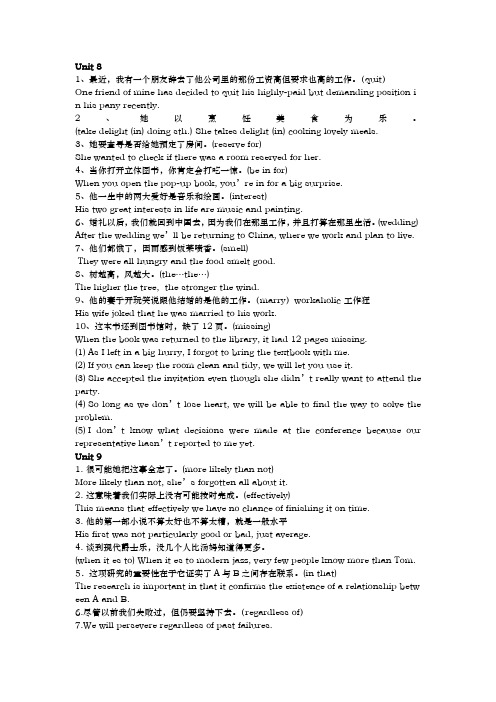
Unit 81、最近,我有一个朋友辞去了他公司里的那份工资高但要求也高的工作。
(quit)One friend of mine has decided to quit his highly-paid but demanding position i n his pany recently.2、她以烹饪美食为乐。
(take delight (in) doing sth.) She takes delight (in) cooking lovely meals.3、她要查寻是否给她预定了房间。
(reserve for)She wanted to check if there was a room reserved for her.4、当你打开立体图书,你肯定会打吃一惊。
(be in for)When you open the pop-up book, you’re in for a big surprise.5、他一生中的两大爱好是音乐和绘画。
(interest)His two great interests in life are music and painting.6、婚礼以后,我们就回到中国去,因为我们在那里工作,并且打算在那里生活。
(wedding) After the wedding we’ll be returning to China, where we work and plan to live.7、他们都饿了,因而感到饭菜喷香。
(smell)They were all hungry and the food smelt good.8、树越高,风越大。
(the…the…)The higher the tree, the stronger the wind.9、他的妻子开玩笑说跟他结婚的是他的工作。
(marry)workaholic 工作狂His wife joked that he was married to his work.10、这本书还到图书馆时,缺了12页。
当代研究生英语第八单元textA课文讲解

And this fall, Congress is likely to vote on a bill that would make identity theft a federal felony, punishable by up to 15 years in prison. Another bill would give consumers more control over who has access to personal information, such as Social Security numbers. 今年秋季,国会很有可能投票立案决定是 否将身份盗窃定为重罪,其惩罚可高达15年监禁。 另一项议案是使消费者对个人信息有更多的控制 权——比如说保护他们的社会保险号码不被人知。
盗贼们发现,以假身份盗窃,既可让受害者 无以防范,也可以让警方无法追踪。
"It was a very easy crime, " says Ed Mierswinsky, a consumer advocate at U. S. Public Interest Research Group in Washington, D. C. "Forget restitution. Consumers couldn't even obtain peace of mind" from seeing the criminals punished.
vibrant [ˈva ɪbrənt] 亮的;充满生气的
当代研究生英语 第八单元 B课文翻译
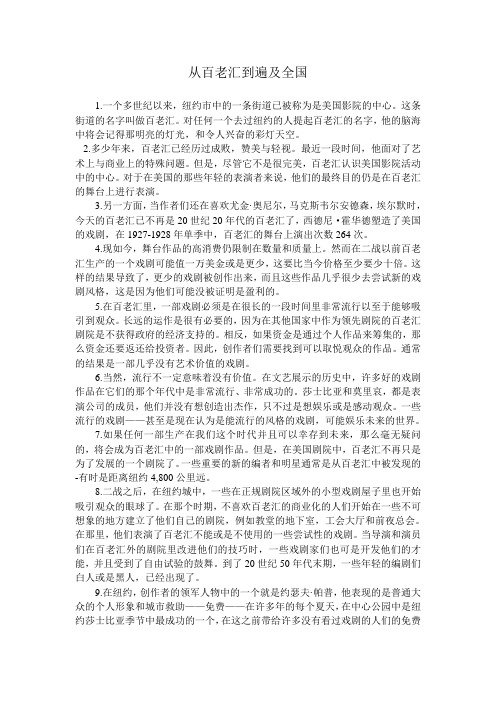
从百老汇到遍及全国1.一个多世纪以来,纽约市中的一条街道已被称为是美国影院的中心。
这条街道的名字叫做百老汇。
对任何一个去过纽约的人提起百老汇的名字,他的脑海中将会记得那明亮的灯光,和令人兴奋的彩灯天空。
2.多少年来,百老汇已经历过成败,赞美与轻视。
最近一段时间,他面对了艺术上与商业上的特殊问题。
但是,尽管它不是很完美,百老汇认识美国影院活动中的中心。
对于在美国的那些年轻的表演者来说,他们的最终目的仍是在百老汇的舞台上进行表演。
3.另一方面,当作者们还在喜欢尤金·奥尼尔,马克斯韦尔安德森,埃尔默时,今天的百老汇已不再是20世纪20年代的百老汇了,西德尼·霍华德塑造了美国的戏剧,在1927-1928年单季中,百老汇的舞台上演出次数264次。
4.现如今,舞台作品的高消费仍限制在数量和质量上。
然而在二战以前百老汇生产的一个戏剧可能值一万美金或是更少,这要比当今价格至少要少十倍。
这样的结果导致了,更少的戏剧被创作出来,而且这些作品几乎很少去尝试新的戏剧风格,这是因为他们可能没被证明是盈利的。
5.在百老汇里,一部戏剧必须是在很长的一段时间里非常流行以至于能够吸引到观众。
长远的运作是很有必要的,因为在其他国家中作为领先剧院的百老汇剧院是不获得政府的经济支持的。
相反,如果资金是通过个人作品来筹集的,那么资金还要返还给投资者。
因此,创作者们需要找到可以取悦观众的作品。
通常的结果是一部几乎没有艺术价值的戏剧。
6.当然,流行不一定意味着没有价值。
在文艺展示的历史中,许多好的戏剧作品在它们的那个年代中是非常流行、非常成功的。
莎士比亚和莫里哀,都是表演公司的成员,他们并没有想创造出杰作,只不过是想娱乐或是感动观众。
一些流行的戏剧——甚至是现在认为是能流行的风格的戏剧,可能娱乐未来的世界。
7.如果任何一部生产在我们这个时代并且可以幸存到未来,那么毫无疑问的,将会成为百老汇中的一部戏剧作品。
但是,在美国剧院中,百老汇不再只是为了发展的一个剧院了。
新发展研究生英语1学生用语UNIT8SOLITUDE翻译
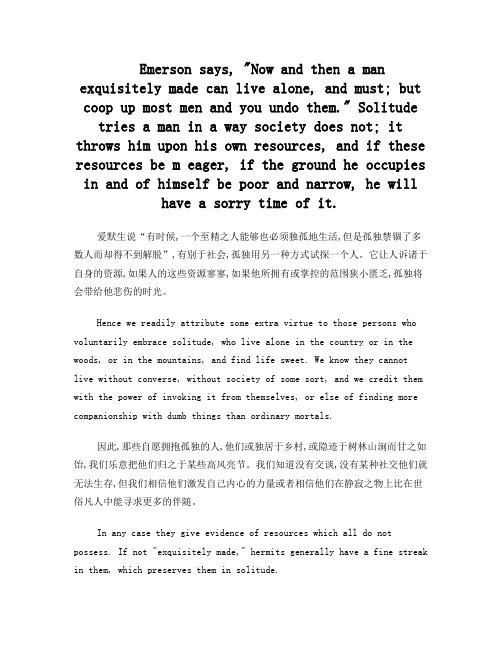
Emerson says, "Now and then a man exquisitely made can live alone, and must; but coop up most men and you undo them." Solitude tries a man in a way society does not; it throws him upon his own resources, and if these resources be m eager, if the ground he occupies in and of himself be poor and narrow, he willhave a sorry time of it.爱默生说“有时候,一个至精之人能够也必须独孤地生活,但是孤独禁锢了多数人而却得不到解脱”,有别于社会,孤独用另一种方式试探一个人。
它让人诉诸于自身的资源,如果人的这些资源寥寥,如果他所拥有或掌控的范围狭小匮乏,孤独将会带给他悲伤的时光。
Hence we readily attribute some extra virtue to those persons who voluntarily embrace solitude, who live alone in the country or in the woods, or in the mountains, and find life sweet. We know they cannotlive without converse, without society of some sort, and we credit them with the power of invoking it from themselves, or else of finding more companionship with dumb things than ordinary mortals.因此,那些自愿拥抱孤独的人,他们或独居于乡村,或隐迹于树林山涧而甘之如饴,我们乐意把他们归之于某些高风亮节。
- 1、下载文档前请自行甄别文档内容的完整性,平台不提供额外的编辑、内容补充、找答案等附加服务。
- 2、"仅部分预览"的文档,不可在线预览部分如存在完整性等问题,可反馈申请退款(可完整预览的文档不适用该条件!)。
- 3、如文档侵犯您的权益,请联系客服反馈,我们会尽快为您处理(人工客服工作时间:9:00-18:30)。
A convenient truth, sadly ignoredIF ALL goes well, in 2011, a year before the Kyoto protocol expires, a new opera will open at La Scala in Milan. It will be based on “An Inconvenient Truth”, the book and film about global warming by Al Gore, the former vice-president. It is easy to see the drama in the story of the failed American presidential candidate turned green crusader (although not in the thickets of statistics into which he sometimes strays). But whether the opera in Milan will end happily or tragically, the composer has not yet revealed.Does Mr Gore, armed with a PowerPoint presentation and mounted on a rickety mechanical ladder, put the sceptics and recalcitrants of climate change to rout? Or do the world's politicians ignore his song and allow timidity, suspicion and recrimination to vanquish the greater good?In real life, the answer to those questions is being debated, amid negotiations over a replacement for the Kyoto treaty. Discussions are under way in Bonn and America's Congress right now (see article). The talks are due to culminate in a summit in Denmark next year. But already, the protagonists are blocking out their positions.Most developing countries are as one: almost all the greenhouse gases that have accumulated over the past two centuries, and are now heating up the planet, came from the chimneys and exhaust pipes of the rich world. What is more, each person in a rich country adds far more to the build-up than someone from a poorer country does. So, the likes of China and India conclude, the rich world must shoulder its responsibility for fixing the climate.Meanwhile, in America in particular, a chorus of leery politicians points out that China is now churning out greenhouse gases faster than any other country, even if its cumulative tally remains relatively low. Indonesia, India and Brazil are also prolific polluters. Emissions from developing countries are growing so fast that they are likely to swamp any reductions made by the rich world. So there is no point in America and other rich nations cleaning up their act unless rapidly industrialising countries do too.Inconveniently enough, both these arguments are valid. But so is another important and more encouraging observation. It is easier to affect emissions in poor countries, since such places tend to be less energyefficient, to have adopted fewer measures for cutting pollution and to be installing more new capacity. That suggests there is a deal to be done. If the rich world agrees to pay for most of any reduction in the world's emissions, developing countries will allow the cuts to be made wherever they are cheapest.That, more or less, is the premise of the Kyoto protocol. Rich countries agreed to cut their emissions, or to pay for equivalent reductions elsewhere under a scheme known as the Clean Development Mechanism (CDM). In some ways, it has been a great success. Eager Western bankers have spent billions of dollars capturing noxious gases, improving energy efficiency and building wind farms in developing countries.Nonetheless, the scale of the investment remains grossly inadequate. What is more, the scheme gives poor countries a reason to avoid any sort of climate-friendly regulation, including measures they could readily afford. Why spend money, when someone else will pay you to do it? Chinese refrigerant factories, for example, produce a lot of trifluoromethane, which is a potent greenhouse gas, but one that can be easily isolated and destroyed. Yet the government does not regulate the stuff, so that its makers can exploit the CDM to sign lucrative contracts, which the government then taxes heavily.Again, the outlines of a deal are clear. The rich world should agree to increase the flow of clean investment dramatically, in exchange for a promise from fast-growing developing countries to take some steps of their own to curb emissions. That should not be such a hard sell in China and India. After all, their governments are all too aware of the devastating consequences if global warming were to cause the Himalayan glaciers to melt, or crop yields to fall (see article). Moreover, Chinese and Indian firms, in particular, have become accustomed to the flow of funds from the CDM, and would be unhappy to see it evaporate.Western countries would benefit too, thanks to the lower cost of cutting emissions abroad. That is why the European Union allows international offsets to be used in its “cap-and-trade” scheme. In this, government s issue a set number of permits to produce greenhouse gases, obliging firms to cut their own emissions or buy spare permits from others. The cap-and-trade scheme that America's Senate began debating this week would also allow firms to fulfil some of their obligations through green investments in other countries.But the bill in Congress would allow only a small number of offsets, and only from factories that do not compete with American firms—a big hurdle in a globalised world. Worse, to make the bill more palatable toChina-bashing politicians, its authors have strengthened provisions that would impose tariffs on energy-intensive imports from countries that are not taking “comparable action” against climate change, meaning all developing countries. That is a recipe for a trade war, which would only compound the economic pain of global warming. Just when a deal is possible, the stage is being set for a tragedy of Wagnerian dimensions.Is it Getting Too Warm for Penguins?King penguins are supposed to be a wildlife success story. The flightless Antarctic bird —the second-biggest penguin after its movie-star emperor cousin —was hunted into near-extinction by sailors in the 19th century, who used their fat as cooking oil. When the slaughter ended — penguin fat no longer being the preferred way to simmer your cruise dinner —the penguin bounced back, and today numbers about 2 million. This is a healthy, robust species that sits near the top of the complex Antarctic food web.They may not stay that way much longer. A new report by French scientists in the Proceedings of the Natural Academy of Sciences finds that king penguins could be wiped out over the coming decades due to global warming. Led by Yvon Le Maho, a physiologist at French National Center for Scientific Research, the team of researchers followed 456 adult birds with radio transponders implanted beneath their skin. Over an eight-year period, the researchers correlated survival rate to changes in sea surface temperatures, and found that in warm years, penguin chicks were less likely to survive the lean months of winter, because there wasn't sufficient fish to feed them. (Warmer temperatures seem to lower fish populations in the Southern Ocean, off Antarctica.) Adult survival rates dropped as well in warmer years. Ultimately, the scientists report that a 0.47 degree F increase in the temperature of the Southern Ocean —considerably below current forecasts for the next several decades —would reduce penguin numbers by 9%, enough to touch off a population collapse. "Our findings suggest that king penguin populations are at heavy extinction risk under the current global warming predictions," the study's authors wrote.That's bad news for the penguins, and worse news for the rest of Antarctic wildlife. Sitting near the top of the food chain, the king penguins are useful markers for the health of the rest of the Antarctic ecosystem. If global warming means they're not getting enough food, the conditions below the penguins could be even worse. Temperature rise due to climate change is occurring quicker at the poles than the rest of the planet — on the Antarctic Peninsula, temperatures have risen five times faster than the global average over the past 50 years. Even if we can manage to slow the growth in carbon emissions, the poles will likely continue to warm. Though the species that have evolved to survive in harsh Antarctic conditions are necessarily tough, they're also delicate. They're built for the snow and ice — change those conditions, and you take away their habitat andtheir food supply. Extinction comes next, and nothing can stop it.The situation is no better in the Arctic north, where studies predict that polar bear populations will rapidly shrink over the coming decades, thanks again to warming. Environmentalists are pressing the U.S. Fish and Wildlife Service to declare the polar bear threatened, which would make it the first species to be recognized as endangered specifically because of climate change. The government recently failed to meet a self-imposed deadline to make the decision by Feb. 9, and the fate of the polar bear remains unclear. But if we fail to slow down the rate of warming, the polar regions as we know them will no longer exist —and possibly, neither will many of the species who live there now.温室下的企鹅将何去何从?王企鹅成功地演绎了一个关于野生动物的故事。
